Table of Contents
What is Chatbot Marketing?
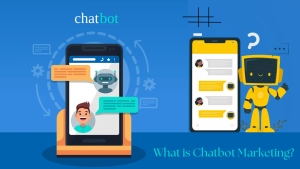
Chatbot marketing is the use of AI-powered conversational tools to engage with customers, streamline interactions, and drive conversions. These automated agents simulate human conversations on platforms like websites, messaging apps, and social media. Chatbots can answer customer inquiries, recommend products, collect leads, and even process transactions, making them a powerful tool for businesses.
Unlike traditional communication methods, chatbots operate 24/7, providing instant support and personalized experiences. They range from simple rule-based systems, which follow predefined scripts, to advanced AI-driven models that leverage machine learning and natural language processing (NLP) to understand and respond to complex queries.
This technology enhances customer engagement, reduces operational costs, and scales effortlessly to handle multiple conversations simultaneously. By integrating chatbots into marketing strategies, businesses can improve customer satisfaction, boost retention, and increase sales, making chatbot marketing an essential component of modern digital marketing.
Types of Chatbots
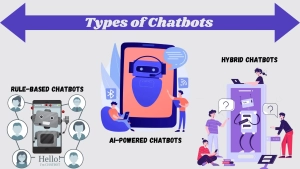
Based on their capabilities and underlying technology, chatbots are divided into several categories:
1. Rule-Based Chatbots: To respond, these adhere to pre-programmed guidelines and scripts.They are ideal for handling simple queries like FAQs or guiding users through basic processes. While limited in scope, rule-based chatbots are reliable for predictable interactions.
2. AI-Powered Chatbots: AI-powered chatbots use natural language processing and machine learning to understand user intent and context.Unlike rule-based bots, they learn from past interactions, improving their ability to deliver personalized and accurate responses
3. Hybrid Chatbots: A combination of rule-based and AI-powered systems, hybrid chatbots offer the best of both worlds. They automate routine tasks while seamlessly transferring complex queries to human agents, ensuring a smooth customer experience.
Benefits of Chatbot Marketing
hatbot marke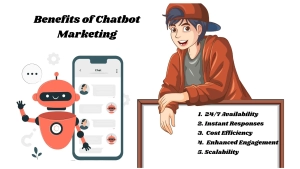
Cting offers a multitude of advantages for businesses and customers alike:
1. 24/7 Availability: Chatbots provide round-the-clock support, ensuring that customers receive assistance regardless of time zones or working hours.
2. Instant Responses: By eliminating wait times, chatbots enhance customer satisfaction and reduce bounce rates, particularly on websites.
3. Cost Efficiency: Automating repetitive tasks reduces the need for extensive human support teams, resulting in significant cost savings.
4. Enhanced Engagement: Interactive conversations captivate users, fostering stronger connections and higher retention rates.
5. Scalability: Chatbots are perfect for companies with expanding clientele since they can manage several chats at once.
How Chatbots Work
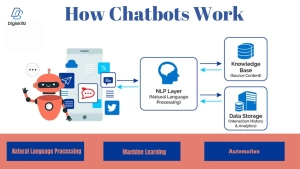
Chatbots rely on a blend of technologies to simulate human-like conversations:
1. Natural Language Processing (NLP): NLP enables chatbots to interpret and process human language. By breaking down user input into smaller components, chatbots understand context and intent, facilitating accurate responses.
2. Machine Learning (ML): Machine learning models help chatbots learn from past interactions, improving their ability to handle diverse queries and deliver personalized solutions.
3. Automation: Chatbots automate repetitive processes like order confirmations, appointment scheduling, and FAQ responses, freeing up human agents for more complex tasks.
Chatbot Platforms and Tools
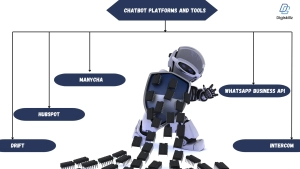
Chatbot platforms and tools have become essential for businesses to implement conversational marketing strategies effectively. These tools enable the creation, deployment, and management of chatbots across various channels like websites, social media, and messaging apps.
1. Drift: Drift specializes in conversational marketing, helping businesses engage website visitors, qualify leads, and book meetings in real time.It is popular for B2B marketing and sales automation.
2. HubSpot: HubSpot’s chatbot builder integrates seamlessly with its CRM, enabling businesses to create personalized customer experiences, automate support, and streamline sales processes.
3. ManyChat: Designed for Facebook Messenger and Instagram, ManyChat allows businesses to create bots for social media engagement, lead generation, and customer support with an easy-to-use interface.
4. WhatsApp Business API: Ideal for global businesses, this tool enables customer interaction on WhatsApp, offering features like notifications, customer support, and transactional updates.
5. Intercom: Known for its versatility, Intercom supports customer service, sales, and marketing with AI-driven chatbots that integrate with various platforms.
Because every platform has different characteristics, it’s critical to select one that complements your company’s objectives. Implementing the right chatbot tool can enhance customer interactions, improve efficiency, and drive measurable results.
Chatbot Marketing Use Cases
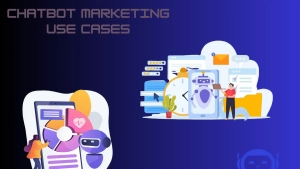
Chatbots can be used in many different industries:
1. E-commerce: Provide instant product recommendations based on user preferences.Assist customers during checkout by addressing queries.Send updates on order status, shipping, and delivery.
2. Lead Generation: Qualify leads by gathering information through interactive conversations.Send quality leads to the sales department so they may be followed up upon.Engage website visitors in real-time to convert them into prospects.
3. Customer Support: Offer instant responses to frequently asked questions.Handle refund requests, cancellations, and troubleshooting issues.Reduce support team workload by resolving routine queries.
4. Upselling and Cross-Selling: Make recommendations for related goods or services while the customer is making a purchase.Use data insights to recommend upgrades or premium versions of products.
5.Event Marketing: Register attendees, provide event details, and answer logistical questions.Send reminders and updates about schedules or last-minute changes.
Integrating Chatbots with Marketing Channels
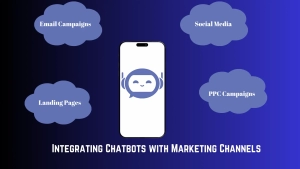
Chatbots can seamlessly integrate into various marketing channels to enhance overall effectiveness:
1. Email Campaigns: Embed chatbots into email campaigns to provide direct interaction options. For instance, a chatbot can address common customer concerns highlighted in emails, driving engagement.
2. Social Media: Deploy chatbots on platforms like Facebook Messenger, Instagram Direct, or Twitter to manage inquiries, promote products, and interact with followers.
3. Landing Pages: Add chatbots to landing pages to guide visitors, answer questions, and improve conversion rates.
4. PPC Campaigns: Use chatbots to engage users who click on paid ads, capturing leads and providing relevant information instantly.
Best Practices for Chatbot Marketing
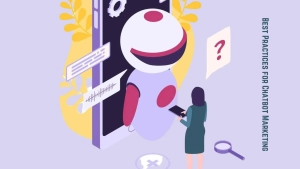
To ensure successful chatbot marketing campaigns, consider these best practices:
1. Chatbot marketing: Craft Natural and Engaging Scripts: Conversations should feel authentic and human-like.Avoid using too formal or robotic language as this could turn off users.
2. Chatbot marketing: Focus on Personalization: Tailor chatbot responses based on user preferences, browsing history, and past interactions.
3. Chatbot marketing: Ensure a Seamless Conversational Flow: Design intuitive conversation pathways that guide users effortlessly toward their goals.
4. Chatbot marketing: Offer Escalation Options: Always provide the option to connect with a human agent for complex queries or unresolved issues.
5. Chatbot marketing: Regularly Test and Optimize: Monitor chatbot performance and update scripts or workflows to address emerging customer needs and trends.
Challenges in Chatbot Marketing
While chatbot marketing offers immense potential, it comes with its own set of challenges:
1. Miscommunication: Chatbots may occasionally misinterpret user intent, leading to frustration.
Solution: Regularly update and train chatbots using real customer interactions.
2. Data Privacy Concerns:Consumers are increasingly cautious about sharing personal data.
Solution: Be transparent about data collection practices and comply with regulations like GDPR or CCPA.
3. Over-Automation:Excessive reliance on chatbots can make customer interactions feel impersonal.
Solution: Strike a balance between automation and human intervention for a more personalized experience.
The Future of Chatbot Marketing
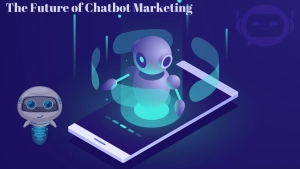
1. Multichannel Integration: Chatbots will expand beyond websites and social media platforms like Facebook Messenger and WhatsApp, integrating seamlessly with voice assistants, IoT devices, and mobile apps. This will enable businesses to engage with customers across multiple touchpoints, offering personalized, real-time interactions wherever the customer is.
2. Enhanced AI and NLP Capabilities: As AI and natural language processing (NLP) technologies continue to advance, chatbots will become better at understanding and responding to user intent. They will be able to recognize emotions, tone, and context in conversations, leading to more accurate and relevant responses tailored to individual customer needs.
3. Personalized Customer Experiences: Future chatbots will provide highly personalized experiences by learning from every interaction. By analyzing user data, chatbots will proactively offer recommendations, reminders, and targeted information, making interactions more relevant and valuable to the user.
4. Integration with Marketing Automation Tools: Chatbots will increasingly work in tandem with marketing automation systems to collect customer data, nurture leads, and execute targeted campaigns. This integration will improve lead generation and conversion rates by guiding customers through the sales funnel in an automated yet personalized manner.
5. Post-Purchase Engagement: Businesses will use chatbots for post-purchase interactions, such as collecting feedback, offering loyalty rewards, and providing personalized product recommendations. One-time consumers will become repeat customers as a result of this ongoing involvement, which will improve brand loyalty and customer relationships.
6. Proactive Customer Support and Assistance: Chatbots will not only respond to queries but will also anticipate customer needs, offering proactive support and assistance. This can include reminders for service renewals, troubleshooting, or helping customers navigate products and services.
7. Improved Lead Qualification and Conversion: As chatbots become smarter, they will be able to more effectively qualify leads by asking the right questions, assessing customer interest, and directing them to relevant products or services. This will result in more efficient lead conversion and higher ROI for marketing campaigns.
8. Human-like Interactions: The ultimate goal for chatbot marketing is to create human-like interactions that feel authentic and engaging. With continuous improvements in AI, chatbots will become capable of having conversations that closely resemble those with human agents, ensuring a more enjoyable and seamless customer experience.
Conclusion
Chatbot marketing is redefining customer engagement, making it more dynamic, personalized, and efficient. From automating routine interactions to delivering tailored experiences, chatbots empower businesses to build stronger relationships with their customers.
By leveraging the right tools, best practices, and strategies, businesses can harness the full potential of chatbot marketing to drive growth and enhance customer satisfaction. The future belongs to brands that embrace this technology to stay ahead in the competitive digital landscape.
Ready to take the leap? Start integrating chatbots into your marketing strategy today and unlock new possibilities for customer engagement and business growth.
AUTHOR: MOHAMMED SAVAD
Learner of DigiSkillz, Digital Marketing Institute in Kottakkal
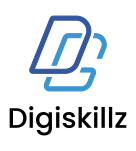

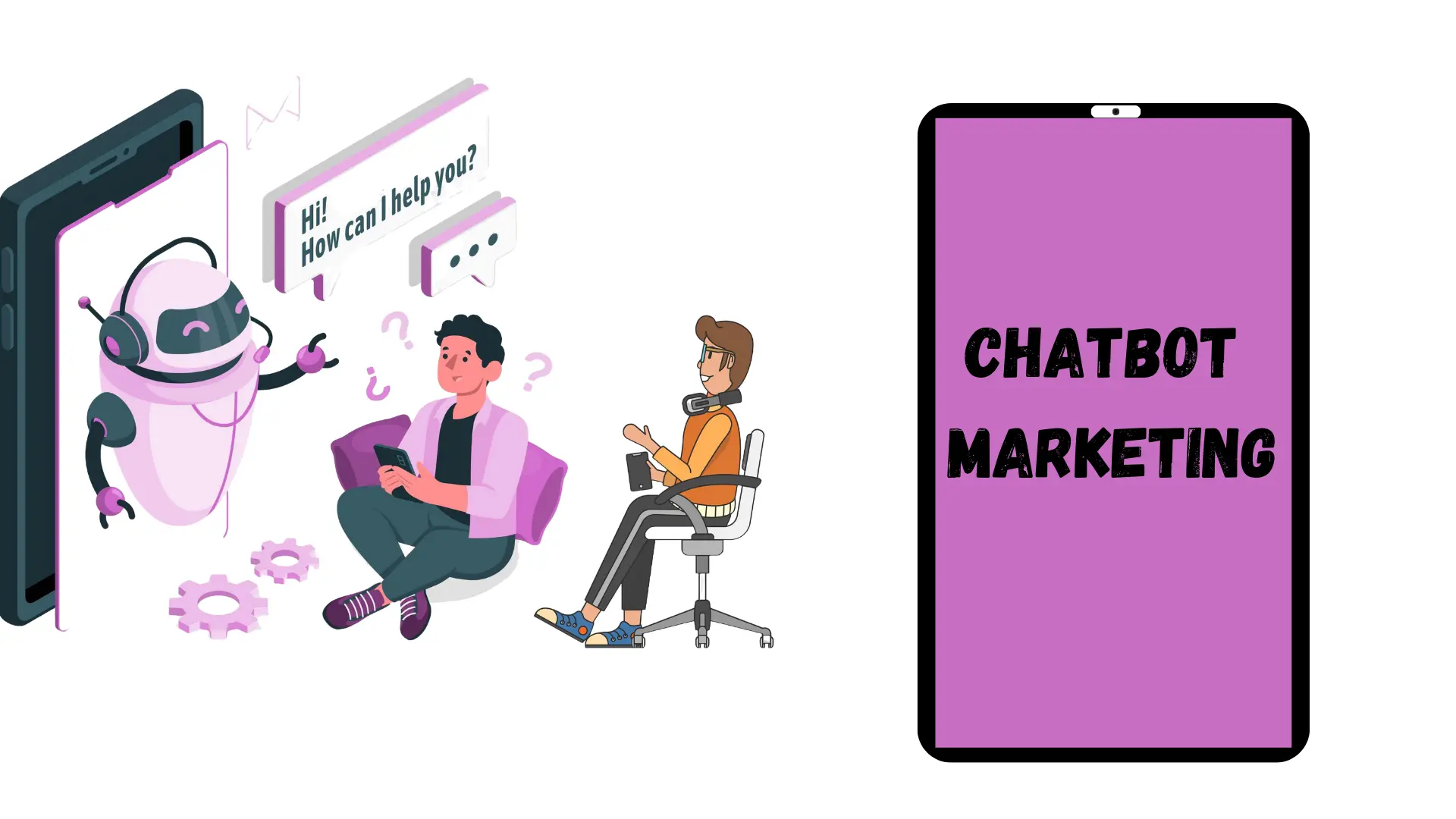


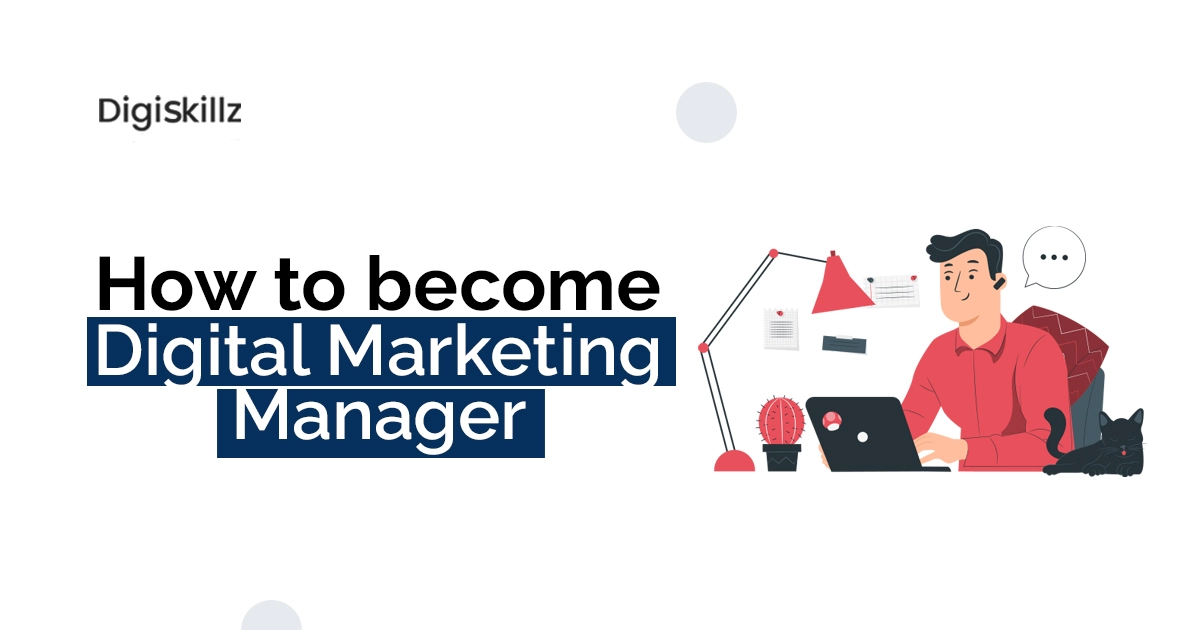
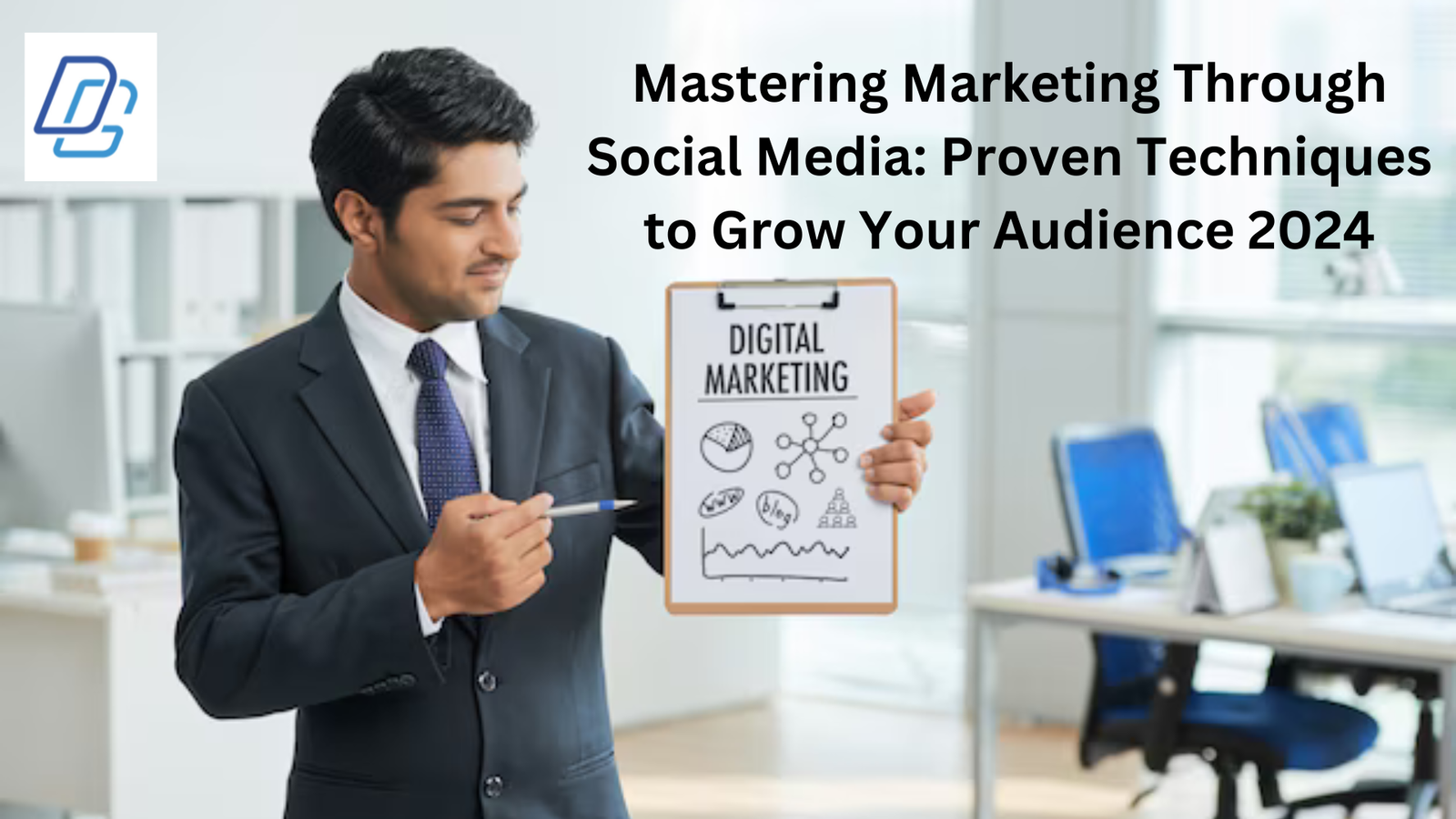


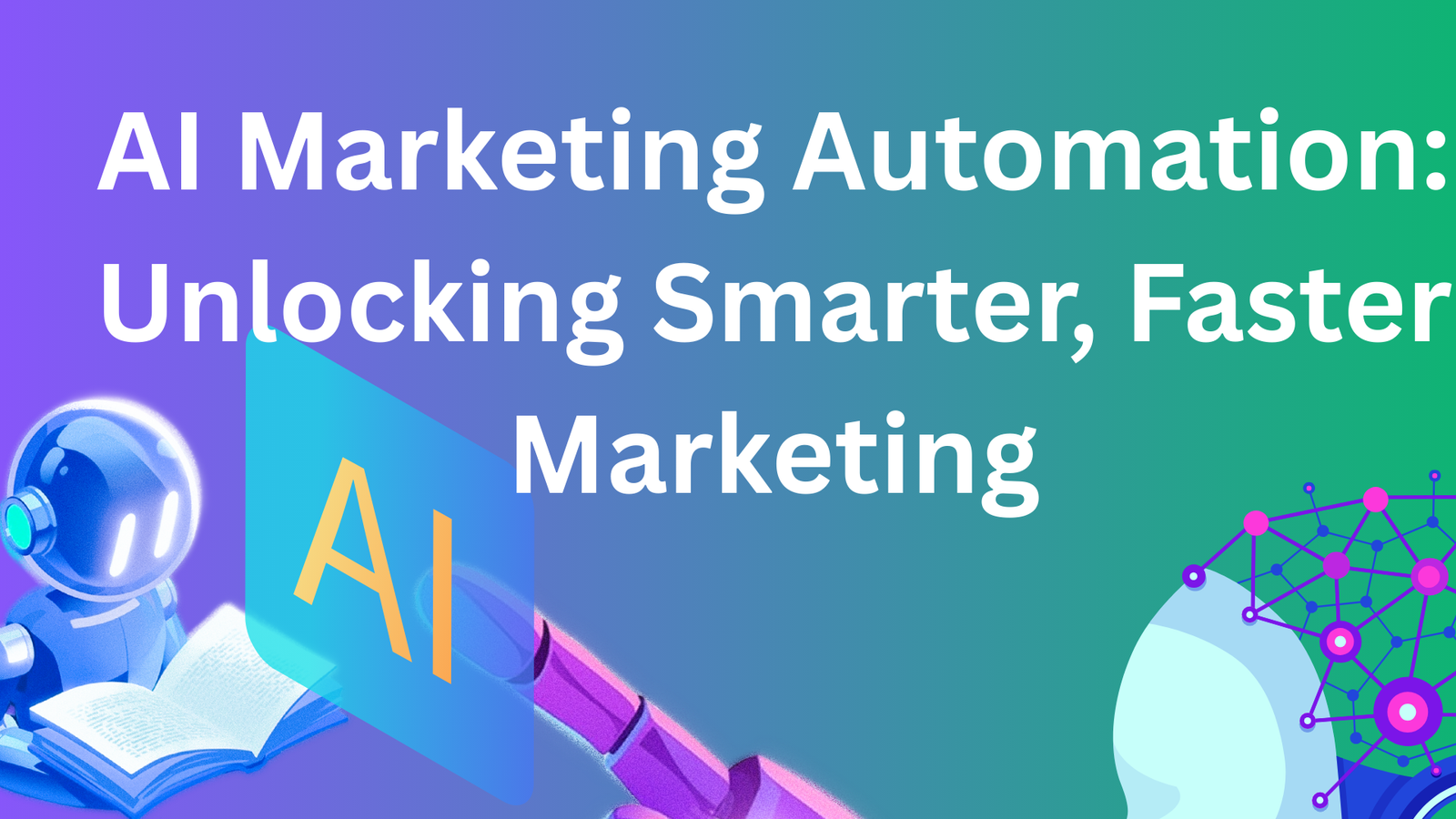
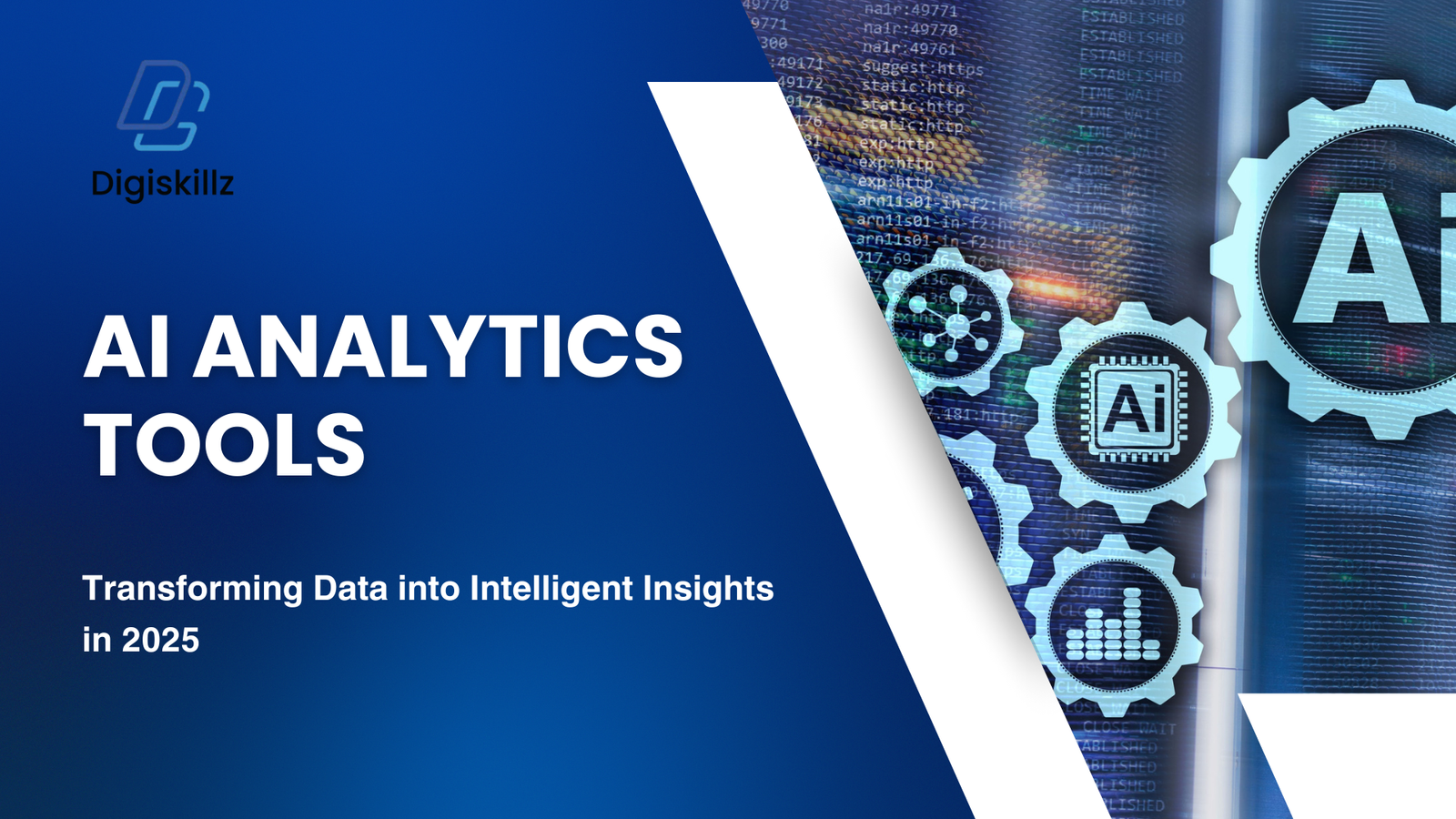
Leave A Comment